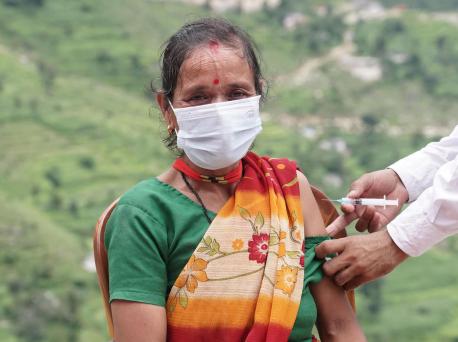
COVID-19 Vaccines Mean a Safe Return to Normal Life in Nepal
"Back in the day, we would hear about typhoid, black fever, pneumonia, measles, but we didn't know much about them," says 47-year-old Damara Bham, who lives in Duhun, in Nepal's far western Darchula District.
"A lot of children would die, but it would never be clear what they died from. We didn't know much about vaccines ... our parents didn't know much either."
Impact of COVID-19 in Nepal
When the COVID-19 pandemic began, fear and suspicion gripped her community, Bham recalls. "We were even afraid of our neighbors ... the way you're afraid of tigers and bears when you enter a jungle, that's how scared we were of the virus."
Watch the video to learn more about how COVID-19 vaccines delivered via COVAX are making a difference in rural Nepal:
To date, Nepal has received more than 3.4 million doses of COVID-19 vaccines via the COVAX Facility, a global alliance formed to ensure the equitable distribution of COVID-19 vaccines worldwide. Many of those doses were donated by the governments of Japan and the U.S. as part of a global strategy to end the pandemic. As a key partner in COVAX, UNICEF is leveraging decades of experience protecting the world's children from vaccine-preventable diseases.
Now that COVID-19 vaccines have arrived, Bham is one of a growing number of community members who have been vaccinated and are relieved to be able to return safely to normal life. There is more work to be done: just 22 percent of Nepal's population is fully vaccinated.
"I'm happy to have gotten the vaccine," she says. "I feel sure that it will do something good, so my heart is happy."
Everyone deserves their fair shot. UNICEF is working night and day to ensure that countries of every income level have access to lifesaving COVID-19 vaccines, while continuing to help children around the world survive and thrive. You can help.
Top photo: On August 4, 2021, at the Pipalchauri Health Post in Duhun in Nepal’s far west Darchula District, 47-year-old Damara Bham receives the COVID-19 vaccine as part of a vaccination drive. © UNICEF/UN0498888/Prasad Ngakhusi. Video edited by Tong Su for UNICEF USA.
HOW TO HELP
There are many ways to make a difference
War, famine, poverty, natural disasters — threats to the world's children keep coming. But UNICEF won't stop working to keep children healthy and safe.
UNICEF works in over 190 countries and territories — more places than any other children's organization. UNICEF has the world's largest humanitarian warehouse and, when disaster strikes, can get supplies almost anywhere within 72 hours. Constantly innovating, always advocating for a better world for children, UNICEF works to ensure that every child can grow up healthy, educated, protected and respected.
Would you like to help give all children the opportunity to reach their full potential? There are many ways to get involved.





